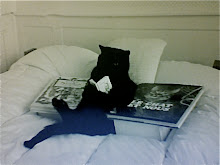Repetitive beginners aren't those with just elementary reading skills. Not the ones who would always choose a film adaptation of a book over the book itself. It's the ones who have overeaten reading matter, which means that reading has eaten them and now they cannot help reading cereal boxes, descriptions of detergents, magazine ads, internet banter from facebook status updates to seedy gossip columns, emails (tons of emails), reviews, interviews. They've made reading the central element of their work and compulsory reading lists have eaten their attention. At home, all the novels have teeth.
...
I got a lovely email from an old friend. In high school we would give each other reading recommendations. I never kept track of what I was reading: allusions led to allusions, accidental choices always swept away designs. But my friend kept a reading journal and had a list of must-reads. He would put ticks by the titles in his journal. (I just had notebooks of quotations, which are now stowed away at my parents', so my feigned erudition plan fell through, we could say.)
The lovely email was like the letters we used to exchange in those dust-covered days of pleasure reading -- it was like a letter and chock-full of great reading recommendations.
Wonderful. But how do I explain that now when I have plenty of reading lists (mostly not devised by myself), I feel that I read almost nothing? Ever since I decided to study literature at university I have increasingly felt the teeth of books. Before that I would sometimes fall asleep with a book. Now I am always prodded by the pencil left between the pages.
In terms of recommendations, I feel like sending my friend this one link: to an article about Margaret Drabble's new book. I can really relate to Drabble's interest in jigsaw puzzles. I don't like them myself, but I know what it's like to desperately need a hobby other than reading.
I am currently knitting two scarves (I never thought I would knit anything, ever). Because of the scarves I haven't posted anything here in a longer while.
But I send my love to the accidental internet tourists and friends who might stop by.
Recommendations for me on how to respond to that letter and/or reading recommendations, please!
HASTAC.org Migrates to HASTAC Commons
3 years ago



3 comments:
I know how it feels when reading becomes work.
My recommendation would be to suggest excellent books which are not the genre he normally reads. For example, if he recommends a lot of literary fiction or poetry, try some of that excellent book-length nonfiction that the USA produces: the Michael Pollens, the Marc Kurlanskys, the John McPhees. Or collections of letters (I just devoured the Mitford girls one, although perhaps you have to be a Mitford nut to like them). Or someone like Monica Dickens who is not fashionable, but is a straightforward and excellent read.
Thanks!!! And sorry for the late reply. I think I'll look up your recommendations myself first ;-)
My friend is a historian with a penchant for sci-fi and speculative fiction. I think I'll recommend Angela Carter who, it seems, is read less and less (and almost unknown in the US to my chagrin).
There are Polish editions of Heroes and Villains (as Marianna i barbarzyńcy) and The Magic Toyshop (asMagiczny sklep z zabawkami). With his library skills he should have no trouble finding them. And he can always call my mom and ask for my copies.
As for Pollan, have you read his last piece in the New York Times? He claims that feminism is the mother of all food-related evils: how do those women dare to work for money--they should be cooking. Apparently, cooking without pleasure connotes nutrition in his mind. I don't know why he assumes the daddies can't do the cooking.
Angela Carter is always an excellent choice. Her nonfiction collection is superb too, if you haven't found that yet. What about really excellent children's sci-fi?
Just now I have an urge to read all the excellent 1960s-1970s fiction for children which I missed because I was only reading pony books. Francis Spufford's Child That Books Built is triggering it.
I didn't read that Pollan article, but did quote the "woman in kitchen" thing to a (feminist) friend who had, and he said it wasn't true – Pollan didn't mean it that way. I should probably go read to find out.
Post a Comment